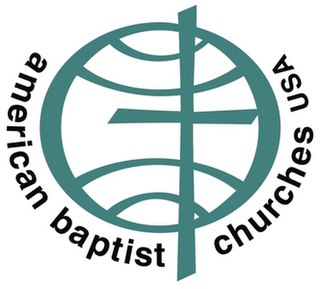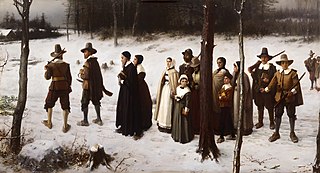Baptists are a branch of Christianity distinguished by baptizing only professing Christian believers and doing so by complete immersion. Baptist churches generally subscribe to the doctrines of soul competency, sola fide, sola scriptura and congregationalist church government. Baptists generally recognize two ordinances: baptism and communion.

The Southern Baptist Convention (SBC), alternatively the Great Commission Baptists (GCB), is an association of Baptist Christian churches based in the United States. It is the world's largest Baptist organization and the largest Protestant and second-largest Christian body in the United States. The SBC is a cooperation of fully autonomous, independent churches with commonly held essential beliefs that pool some resources for missions.

The American Baptist Churches USA (ABCUSA) is a Baptist Christian denomination established in 1907 as the Northern Baptist Convention, and named the American Baptist Convention from 1950 to 1972. It traces its history to the First Baptist Church in America (1638) and the Baptist congregational associations which organized the Triennial Convention in 1814.
The Evangelical Lutheran Church in America (ELCA) is a mainline Protestant Lutheran church headquartered in Chicago, Illinois. The ELCA was officially formed on January 1, 1988, by the merging of three Lutheran church bodies. As of 2022, it has approximately 2.9 million baptized members in 8,640 congregations.

The United Church of Christ (UCC) is a socially liberal mainline Protestant Christian denomination based in the United States, with historical and confessional roots in the Congregational, Restorationist, Continental Reformed, and Lutheran traditions, and with approximately 4,600 churches and 712,000 members. The UCC is a historical continuation of the General Council of Congregational Christian churches founded under the influence of New England Puritanism. Moreover, it also subsumed the third largest Calvinist group in the country, the German Reformed. Notably, its modern members' theological and socio-political stances are often very different from those of its predecessors.

Open communion is the practice of some Protestant Churches of allowing members and non-members to receive the Eucharist. Many but not all churches that practice open communion require that the person receiving communion be a baptized Christian, and other requirements may apply as well. In Methodism, open communion is referred to as the open table, meaning that all may approach the Communion table.

A charitable organization or charity is an organization whose primary objectives are philanthropy and social well-being.

Religious activities generally need some infrastructure to be conducted. For this reason, there generally exist religion-supporting organizations, which are some form of organization that manages:
A 501(c) organization is a nonprofit organization in the federal law of the United States according to Internal Revenue Code. Such organizations are exempt from some federal income taxes. Sections 503 through 505 set out the requirements for obtaining such exemptions. Many states refer to Section 501(c) for definitions of organizations exempt from state taxation as well. 501(c) organizations can receive unlimited contributions from individuals, corporations, and unions.

A free church is any Christian denomination that is intrinsically separate from government. A free church neither defines government policy, nor accept church theology or policy definitions from the government. A free church also does not seek or receive government endorsements or funding to carry out its work. The term is only relevant in countries with established state churches. Notwithstanding that the description "free" has no inherent doctrinal or polity overtones. An individual belonging to a free church is known as a free churchperson or, historically, free churchman.
A church tax is a tax collected by the state from members of some religious denominations to provide financial support of churches, such as the salaries of its clergy and to pay the operating cost of the church. Not all countries have such a tax. In some countries that do, people who are not members of a religious community are exempt from the tax; in others it is always levied, with the payer often entitled to choose who receives it, typically the state or an activity of social interest.
A 501(c)(3) organization is a United States corporation, trust, unincorporated association or other type of organization exempt from federal income tax under section 501(c)(3) of Title 26 of the United States Code. It is one of the 29 types of 501(c) nonprofit organizations in the US.
Approximately 15.3% of Americans identify as Baptist, making Baptists the second-largest religious group in the United States, after Roman Catholics. Baptists adhere to a congregationalist structure, so local church congregations are generally self-regulating and autonomous, meaning that their broadly Christian religious beliefs can and do vary. Baptists make up a significant portion of evangelicals in the United States and approximately one third of all Protestants in the United States. Divisions among Baptists have resulted in numerous Baptist bodies, some with long histories and others more recently organized. There are also many Baptists operating independently or practicing their faith in entirely independent congregations.
Although most Baptist groups are congregationalist in polity, some have different ecclesiastical organization and adopt an episcopal polity governance. In those churches the local congregation has less autonomy and the bishop oversees them, assigning pastors and distributing funds.
A nonpartisan organization, in American politics, is a non-profit organization organized United States Internal Revenue Code that qualifies certain non-profit organizations for tax-exempt status because they refrain from engaging in certain political activities prohibited for them. The designation "nonpartisan" usually reflects a claim made by organizations about themselves, or by commentators, and not an official category per American law. Rather, certain types of nonprofit organizations are under varying requirements to refrain from election-related political activities, or may be taxed to the extent they engage in electoral politics, so the word affirms a legal requirement. In this context, "nonpartisan" means that the organization, by US tax law, is prohibited from supporting or opposing political candidates, parties, and in some cases other votes like propositions, directly or indirectly, but does not mean that the organization cannot take positions on political issues.

Protestantism is the largest grouping of Christians in the United States, with its combined denominations collectively comprising about 43% of the country's population in 2019. Other estimates suggest that 48.5% of the U.S. population is Protestant. Simultaneously, this corresponds to around 20% of the world's total Protestant population. The U.S. contains the largest Protestant population of any country in the world. Baptists comprise about one-third of American Protestants. The Southern Baptist Convention is the largest single Protestant denomination in the U.S., comprising one-tenth of American Protestants. Twelve of the original Thirteen Colonies were Protestant, with only Maryland having a sizable Catholic population due to Lord Baltimore's religious tolerance.
The Johnson Amendment is a provision in the U.S. tax code, since 1954, that prohibits all 501(c)(3) non-profit organizations from endorsing or opposing political candidates. Section 501(c)(3) organizations are the most common type of nonprofit organization in the United States, ranging from charitable foundations to universities and churches. The amendment is named for then-Senator Lyndon B. Johnson of Texas, who introduced it in a preliminary draft of the law in July 1954.

The legal status of the Universal Life Church encompasses a collection of court decisions and state executive branch pronouncements determining what rights the Universal Life Church (ULC) and comparable organizations have as religious organizations.









